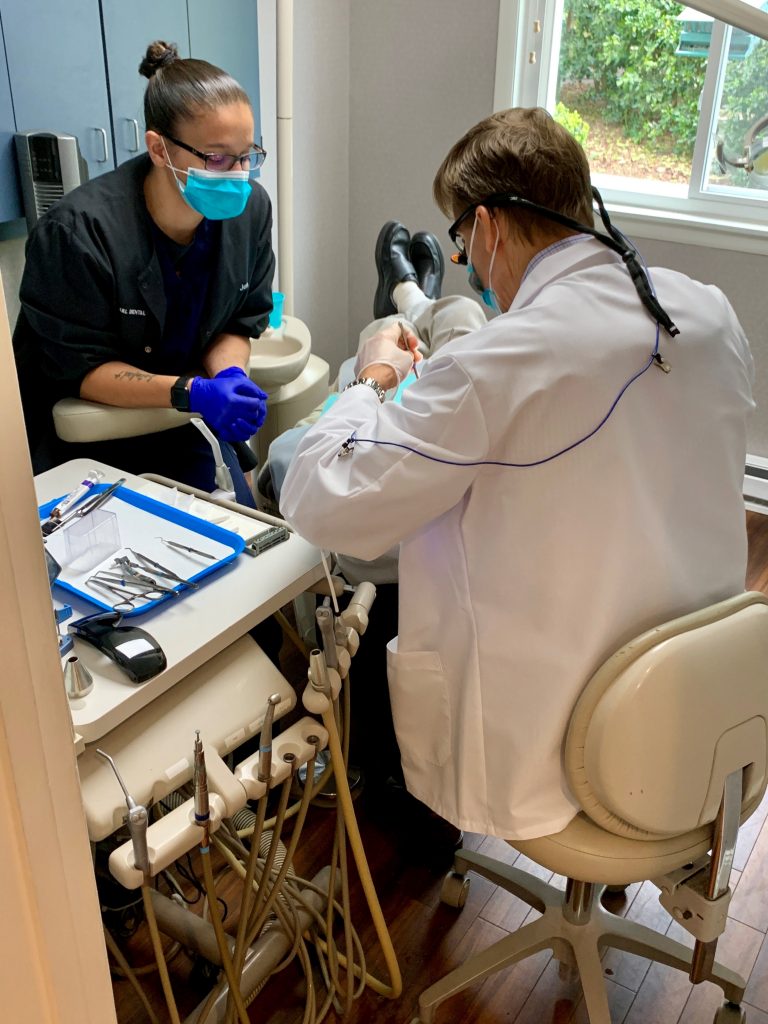
When you look in the mirror, are you suddenly seeing a “toothy” grin where you used to see a healthy smile with equal amounts of tooth and gum tissue? Are you suddenly struggling with sensitive teeth? You may be dealing with receding gums. While many people think of dental problems as relating to only teeth, soft tissue health is just as important to the overall appearance and function of your smile. Gum tissue recession is extremely common and needs to be monitored as it reflects the attachment of the gums to the teeth and underlying bone. Like many other oral health conditions, preventive dentistry, routine care, and understanding the underlying causes are the easiest way to avoid recession.
Warning Signs of Gum Tissue Recession
Unlike cavities and nerve infections which cause tooth pain, recession and gum issues are often painless which makes detection more difficult. Routine hygiene visits include periodontal measurements that monitor the amount of recession and gingival pockets over time. This allows for individualized homecare routines and personalized recommendations to keep your gums as healthy as possible. Minor recession is measured and monitored to ensure gum stability. Moderate and severe recession may involve a referral to a periodontist, or gum specialist for evaluation.
Catching recession early allows for a more minimal intervention. Warning signs for recession and gum disease include bleeding gums, loose teeth, tissue irritation, cold sensitivity, longer looking teeth, and a color differential along the gumline meaning the roots of the teeth are now exposed. The following includes common causes for recession:
1 – Periodontal Disease
Recession is a type of periodontal (gum) disease. Periodontal disease is a reflection of the attachment of the gums to the teeth and underlying bone. Attachment is measured by both pocketing in between the gum and tooth and also by how much gingiva (gum) is present due to recession. When plaque or calculus accumulates below the gum line, the bacteria can damage soft tissue causing larger pockets between the teeth and recession.
2 – Genetic Predisposition
Some people are simply born with inherited traits that make them more likely to experience gum recession. Enzymes and the pH of your saliva can lead to an oral environment prone to calculus and bacteria “build up”. Your DNA can also dictate the thickness and quality of your gingival tissue.
3 – Insufficient Oral Hygiene
Poor oral hygiene will significantly increase your risk for periodontal disease and gum recession. Poor oral hygiene does not only include people who don’t brush and floss daily- It is also possible to cause recession by brushing or flossing too aggressively. A soft toothbrush should be used in gentle circular motions along the gumline. The pressure of the toothbrush should be almost feather-light and should not cause the bristles to splay out while brushing. Many people with recession switch to an electric toothbrush to get the super clean feeling without applying too much pressure.
4 – Hormonal Changes in Women
The hormone fluctuations experienced during puberty, pregnancy, and menopause can cause gingival inflammation and bleeding. Gum disease is so common in expectant mothers that it has its own name, pregnancy gingivitis. It’s no surprise that these hormonal changes can lead to increased soft tissue sensitivity and risk for gum disease.
5 – Tobacco Use
Smoking, chewing, and other tobacco usage can all be detrimental to oral health. While most people think of the dark stains tobacco leaves behind on teeth, tobacco usage also damages soft tissue. Over time, damage from tobacco use can lead to significant recession and sensitivity along with other health concerns.
6 – Teeth Grinding and Orthodontic Concerns
People who suffer from bruxism, teeth grinding and clenching, should seek treatment for this condition right away. It may seem like a harmless bad habit, but the excessive pressure and stress on the teeth and supportive bone and soft tissue can be very damaging. Gum recession is just one of many negative long term effects of untreated bruxism. Similarly, people who have misaligned teeth can experience uneven biting pressure that leads to a break down in the connective tissue between the teeth and gums. If smile alignment isn’t corrected with orthodontic treatment (braces), soft tissue recession may occur as a consequence.
7 – Piercings
Lip and tongue piercings can rub against the gums, leading to irritation and recession. The introduction of metals into the mouth can also cause problems for those who have sensitivities or allergies to these materials. In the weeks and months after you receive a piercing, make sure to monitor your soft tissue for any changes. Talk to your dentist or remove your piercing right away if you notice changes to your gum tissue.
Visit McCarl Dental Group in Greenbelt for Our Healing Touch
At McCarl Dental Group in Greenbelt, we have a team of skilled dentists and hygienists with the knowledge and experience necessary to help you prevent gum recession. We also work closely with many local gum specialists if a surgical intervention is necessary for optimal health. If you want to learn more about gum tissue recession, other oral health concerns and treatment options, or you simply want to schedule your next dental checkup, give our Greenbelt dental team a call.
